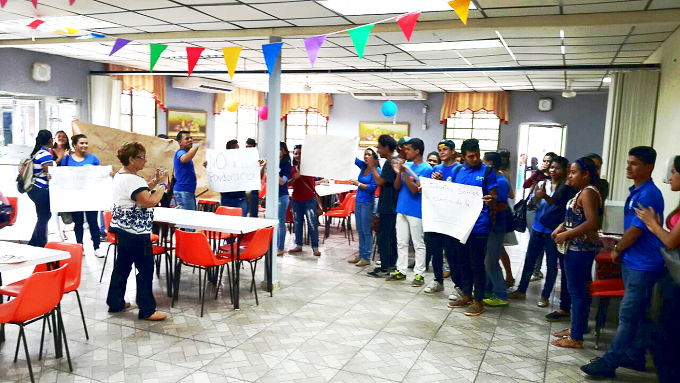
After a prolonged vote count, the
Rector Magnifico’s people lose
by Eric Jackson
The University of Panama went to the polls on June 29 and the results were supposed to be announced the next morning. Instead the results were not proclaimed until July 4, with a two-day deadline after that for people to challenge the results. It appears that nobody has impugned any of the announced results, and that physics professor Eduardo Flores will be the next rector, with his followers winning the races for dean in the faculties of public administration, sciences, nursing, computer sciences and communication, medicine and veterinary medicine. Supporters of the outgoing “Rector Magnifico” Gustavo García de Paredes won the deans’ races in the faculties of architecture, agronomy, pharmacy and the humanities, while independents were elected deans of the faculties of law, fine arts, dentistry, education and economics. Flores and García de Paredes supporters won the directorships of four regional university centers each, with the one in Cocle going to an independent.
García de Paredes did not attend the July 4 proclamation ceremony, nor did he have any public response to Flores’s call to create a transition team. The outgoing administration did announce a resolution that had been passed several weeks earlier and gives job tenure to all temporary university employees with two years or more on the job — something that Flores said that are due anyway — and purporting to keep everyone, from the seven vice-rectors on down, in their current positions. That latter point conflicts with Flores’s promise to review and reorganize the administration. In any case it should be expected that ongoing criminal investigations of the university’s finances are likely to remove some of the outgoing rector’s second tier of management from public employment altogether. Flores has promised to give free access to all university records and information to government auditors, who were grudgingly given access to only partial records only the past few years of the generation-long García de Paredes administration. The next rector, however, has vowed not to take revenge against those who did not support him.
Will Flores take office on October 1 as scheduled, or will the transition be quicker than that? The rumor about campus is that García de Paredes will resign in mid-July. If that happens, then the question of to whom the reins would be handed for the next few months could become a contested legal and political issue. The context is that the old regime did not have the votes: professors and administrators who had supported it in the past threw their support to others and the machine’s breakdown will accelerate as people interested in their own careers make their adjustments to the new leadership.
The big problem for Flores, however, is most probably economic. Some 93 percent of the university’s budget goes to pay salaries, which is why, for example, the library and research labs are pathetic by international standards. The national government is unlikely to come up with substantial new funding, as it is going ever deeper into debt as the Latin American economy on which our import/export and canal sectors are largely based is very weak and expected to remain so for several years. There will probably be attempts to in one way or another recover stolen property, but those are not the sorts of prospects on which sound financial plans can usually be built. Is the solution some variant of rocket science? The next rector is, after all, a physicist.
For leftist sociology professor Marco Gandásegui Jr. the problem is with Panama’s economic model and ruling political and economic elites. The template these days, he complains, is to produce professionals to fill a succession of low-paid temporary jobs in an insecure economy. The people who make most of Panama’s decisions, he adds, tend to have little interest in either science or the human beings who make up Panamanian society.
And the more conservative voices? The engineering faculty seceded from the University of Panama back in the 1970s to found the Panama Technological University, which has more rigorous academic standards than the institution that it left behind. It was not particularly a right-wing movement but it was driven in large part by a yearning for traditional academic values. Jesuit academic standards are applied as best as can be managed at the nation’s Catholic university, USMA. “Conservatives” as in greed-driven hustlers? Those types have a plethora of private universities, some of them on models remarkably like that of Trump University, that by hook or crook got the University of Panama — which has superintending control over all other institutions of higher learning in this country — to approve their existence. By and large Panama’s more conservative academics, students and parents have voted with their feet.
Two pending issues for the new administration will be whether the Normal School in Santiago will be chartered as a university and whether the long-standing demand for an indigenous university will be allowed. The movement for an indigenous university, which is strongest in the Ngable-Bugle Comarca, was steadfastly blocked by García de Paredes for a generation. The movement to promote the Normal School into something more was blocked by the turf claims of the University of Panama’s education faculty, but given recognized needs to improve Panama’s poorly performing public schools the demand for more teachers may drive new political realities on that subject.
~ ~ ~
These announcements are interactive. Click on them for more information.










